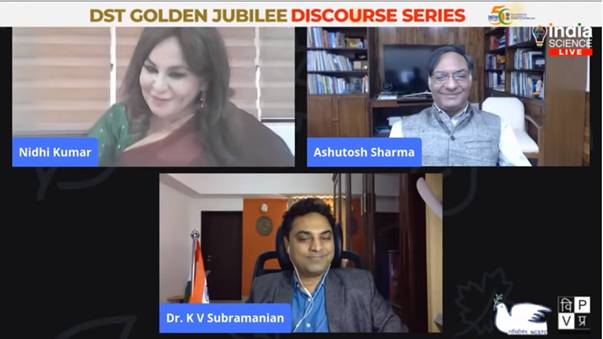DST is working for the fast-changing future needs of the country: DST Secretary Professor Ashutosh Sharma
New Delhi: At a webinar organized to celebrate the 50th year of DST recently, Secretary Department of Science & Technology (DST) Prof Ashutosh Sharma said that with huge emphasis on innovation, startups, creating new jobs and wealth by using science, technology, and innovation; DST is working for the future needs of the country which are changing at a faster pace and scale.
“DST is working to develop capacity, capability in all areas of science and technology. In the last five years, our budget has doubled, and so we are able to explore more in the field of science, technology, and innovation to help the country towards using innovation for a prosperous future,” Professor Sharma said while speaking at the webinar organized by National Council for Science & Technology Communication (NCSTC) and Vigyan Prasar as part of the DST Golden Jubilee Discourse Series –“On the other side of the Pandemic”.
Speaking on the occasion, Dr. Krishnamurthy Subramanian, Chief Economic Advisor (CEA), Government of India, discussed the role of science and technology in nation-building and economic progress of the country and the way forward in the fast-paced changing world.
Complimenting the role of DST in nation-building, he said, “Innovation is a very important component of economic growth. We have done very well so far, but when we look forward to the next 50 years, it is crucial to keep in mind that science, technology, and innovation has a very wide horizon and is necessary for corporates, policymakers, and institutions to use this for economic growth and prosperity by implementing the research in context of the country’s problems. Explorative innovation is path-breaking and may involve failures. So, failure should be tolerated in order to achieve path-breaking results.”
They also emphasised on the need to be more vigilant and strictly follow COVID-19 protocol of masking, using sanitizers and washing hands frequently, avoid crowding, and maintaining social distance to avoid serious consequences of second and third waves of the pandemic similar to some European and other countries.

